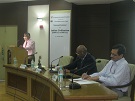The Vivekananda International foundation (VIF), in association with the Archaeological Survey of India (ASI), held a two-day national seminar on the theme of ‘Indian Civilization (2000-500 B.C) on 17 & 18 Jun 2015. The seminar was essentially aimed at underlining the need to start a course correction in the study of India’s ancient history, especially in light of the new historical research and evidences which have surfaced over the past 70-80 years. Till about the beginning of the 20th century the antiquity of Indian civilization was thought to be about 600 B.C i.e. from the time of Buddha. While the discovery of the Harappan civilization in 1922 took the antiquity of the Indian Civilization to 3000 B.C, the emergence of new archaeological evidences since then in many parts of India, especially in northern, central and southern India, take the antiquity of the Indian civilization as far back as 7000 B.C. Even more significantly, there are archaeological evidences to suggest that agriculture in India began almost 9000 years ago, while the process of urbanization in India presumably kicked off even before 1000 B.C. In so far as the extent of this civilization is concerned, it covered the whole of India, and possibly even beyond.
 Clearly, there is a case to project India as a precursor to human civilization. However, there is also need to connect the missing dots and correlate the existing literature with evidences on the ground. The seminar, spread across five sessions over two days, largely dwelt on this theme and several aspects of India’s history during the period 2000-500 B.C. were examined in the process by eminent historians and archaeologists, including Dr. Rakesh Tewari, Director General, Archaeological Survey of India, Dr. B.R. Mani, Addl. Director General, Archaeological Survey of India, Prof. Vibha Tripathi, Department of AIHC Archaeology, Banaras Hindu University, and Prof. Makkhan Lal, Distinguished Fellow, VIF, among others. General NC Vij, Director, VIF, while making the opening remarks, questioned the wisdom of historians who have portrayed Indian freedom fighters as mutineers in textbooks. He also urged on the historians to explore the potential to make the strategic use of history to promote India’s national interests. A large number of research scholars from universities around Delhi also participated in the seminar.
Clearly, there is a case to project India as a precursor to human civilization. However, there is also need to connect the missing dots and correlate the existing literature with evidences on the ground. The seminar, spread across five sessions over two days, largely dwelt on this theme and several aspects of India’s history during the period 2000-500 B.C. were examined in the process by eminent historians and archaeologists, including Dr. Rakesh Tewari, Director General, Archaeological Survey of India, Dr. B.R. Mani, Addl. Director General, Archaeological Survey of India, Prof. Vibha Tripathi, Department of AIHC Archaeology, Banaras Hindu University, and Prof. Makkhan Lal, Distinguished Fellow, VIF, among others. General NC Vij, Director, VIF, while making the opening remarks, questioned the wisdom of historians who have portrayed Indian freedom fighters as mutineers in textbooks. He also urged on the historians to explore the potential to make the strategic use of history to promote India’s national interests. A large number of research scholars from universities around Delhi also participated in the seminar.








